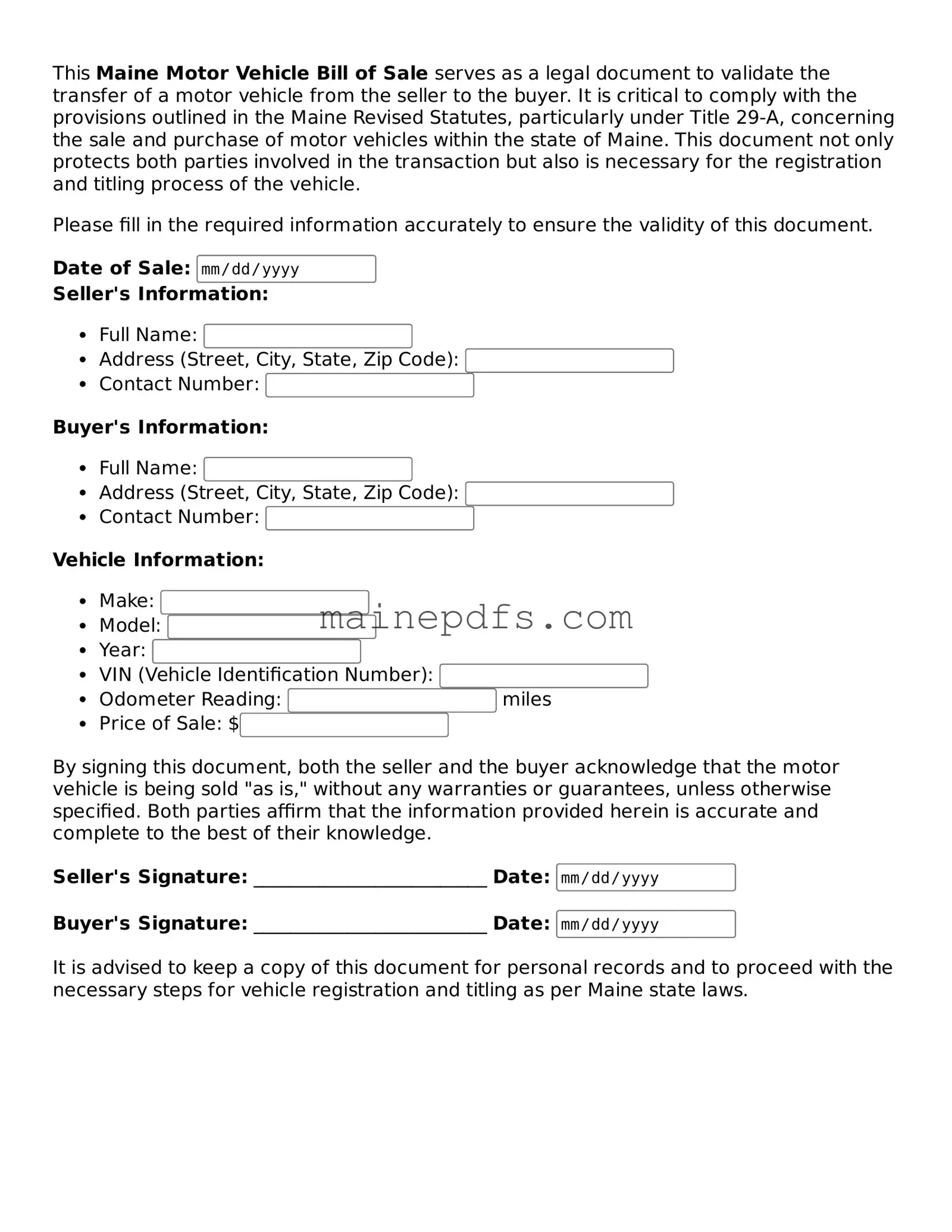The Maine Motor Vehicle Bill of Sale shares similarities with a Warranty Deed in that both serve as proof of an exchange. A Warranty Deed is commonly used in real estate transactions to transfer ownership of property from the seller to the buyer, guaranteeing that the seller has the right to sell the property and that it is free from any encumbrances. Similarly, the Motor Vehicle Bill of Sale is evidence that a vehicle has been legally sold and purchased, signifying a change of ownership. Both documents are pivotal in validating the transfer of ownership and ensuring the rights of both parties are protected.
In comparison, the Maine Motor Vehicle Bill of Sale is akin to a Promissory Note. A Promissory Note is a financial instrument that contains a written promise by one party to pay another a definite sum of money. While the Motor Vehicle Bill of Sale documents the sale and transfer of ownership of a vehicle, a Promissory Note might be involved in the transaction to outline the payment agreement for the vehicle. Therefore, both play crucial roles in transactions, albeit in slightly different aspects — one in conveying ownership and the other in detailing the payment agreement.
The General Bill of Sale is another document that bears resemblance to the Maine Motor Vehicle Bill of Sale. While the former is used for the sale of personal property items, such as electronics or furniture, the latter is specifically for motor vehicles. Both documents serve to legally document the sale and acquisition of an item, providing proof of ownership transfer. The key difference lies in the type of items covered by the sale, but the essence of proving a legal exchange of ownership remains the same.
The Quitclaim Deed, much like the Maine Motor Vehicle Bill of Sale, is used to transfer interest in property. However, the Quitclaim Deed is unique in that it does not guarantee that the grantor's title is valid. In contrast, the Motor Vehicle Bill of Sale explicitly records the sale and transfer of a vehicle from a seller to a buyer and may include warranties regarding the seller's right to sell the vehicle. Both documents are integral in transferring rights, with the main distinction being the type of rights and guarantees involved.
The Release of Liability Form (also known as a Waiver) shares commonalities with the Maine Motor Vehicle Bill of Sale, in the sense that both provide a form of protection to the seller post-transaction. When selling a vehicle, a Release of Liability may be used alongside the Bill of Sale to indicate that the seller is no longer responsible for what happens to the vehicle after the sale. While the Bill of Sale facilitates the transfer of ownership, the Release of Liability ensures the seller is shielded from future liabilities.
Similarly, a Boat Bill of Sale functions much like the Maine Motor Vehicle Bill of Sale but is designed specifically for the sale of boats. Both documents are vital in recording the details of the sale, including information about the buyer, seller, and the item being sold (a vehicle or a boat, respectively). By doing so, they offer a legal proof of purchase and transfer of ownership, ensuring the transaction is recognized by law.
Another related document is the Sales Agreement. This comprehensive document lays out the terms and conditions of a sale, potentially encompassing warranties, delivery details, and payment plans. The Maine Motor Vehicle Missouri Bill of Sale captures the immediate transaction of the sale of a vehicle, often serving as a part of the larger sales agreement. Both are instrumental in delineating the terms of sale and ensuring both buyer and seller are clear on their obligations.
The Maine Motor Vehicle Bill of Sale is also related to an Invoice. An Invoice is issued before the payment to request the amount due for goods or services, while the Bill of Sale is provided after the transaction to prove ownership change. Although they are used at different times in a transaction, both are critical for accounting and legal purposes, documenting the particulars of sales transactions.
Furthermore, the Assignment of Contract is comparable to the Maine Motor Vehicle Bill of Sale in that it involves the transfer of rights or assets. An Assignment of Contract typically transfers rights or obligations under a contract from one party to another. While the focus of the Motor Vehicle Bill of Sale is on the transfer of tangible property (a vehicle), an Assignment could involve various types of rights or commitments. Despite this, both are essential for transferring rights or assets from one party to another.
Last is the Commercial Lease Agreement, which, like the Maine Motor Vehicle Bill of Sale, establishes an agreed-upon transaction between two parties. However, this document pertains to the rental of commercial property, establishing terms and conditions like lease duration, payment amount, and obligations of both the lessee and lessor. Although one document facilitates a sale and the other a lease, both are judicially important for recording the terms of an agreement and protecting the interests of all involved parties.

